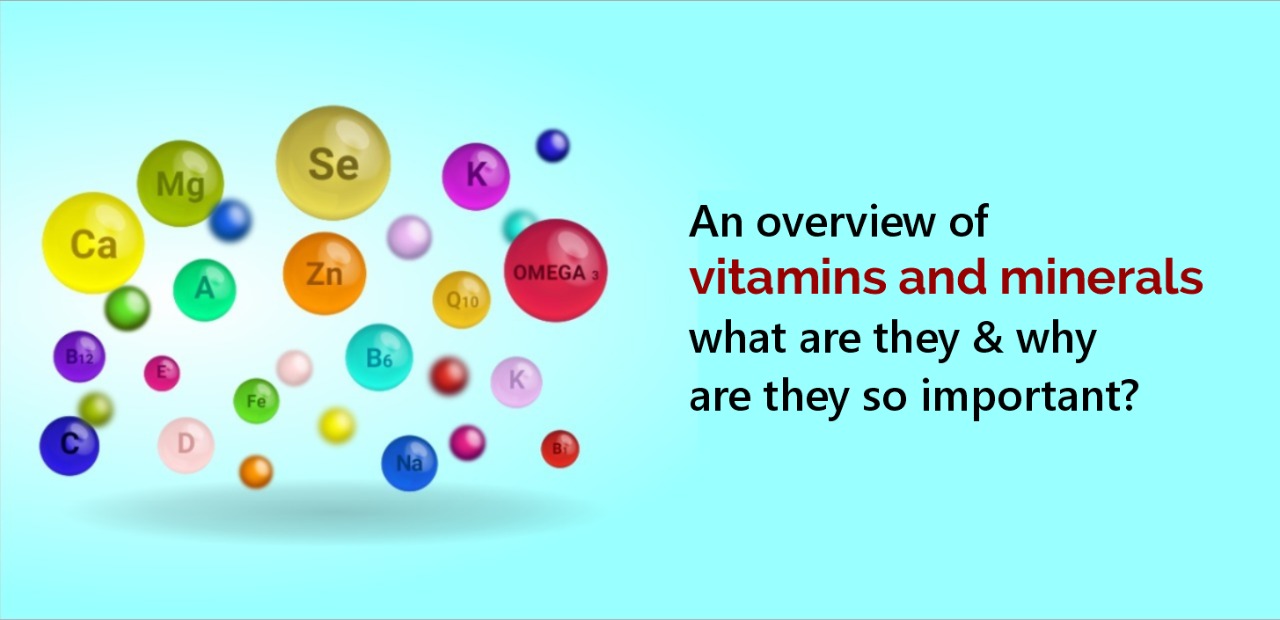

Vitamins and minerals are required for optimal physiological function. They are obtained through the meals you consume daily. In the read below, you will get an Overview of Vitamins and Minerals and how to get the maximum of these from our daily food intake.
Vitamins are classified into two types: fat-soluble and water-soluble.
Vitamins A, D, E, and K are fat-soluble and are stored in your body.
Water-soluble vitamins include vitamin C and the B-complex vitamins (B6, B12, niacin, riboflavin, and folate). The body cannot store these vitamins. Any B or C vitamins that your body does not utilize are excreted through the bloodstream (mostly when you pee). As a result, you require a daily dose of these vitamins.
Vitamins are organic compounds, meaning plants or animals produce them. Minerals are naturally occurring inorganic elements found in soil and water that are absorbed or ingested by plants and animals. Your body requires increased levels of certain minerals, such as calcium, to grow and maintain health. Other minerals, such as copper, chromium, Iron, iodine, selenium, and zinc, are regarded to trace minerals due to their requirement in trace amounts.
What Function Do Vitamins and Minerals Perform?
Vitamins and minerals promote the immune system, appropriate growth and development, and the function of cells and organs. For instance, you're probably aware that carrots are beneficial to the eyes. That is true! Carrots are high in carotenoids, which your body converts to vitamin A, which aids in the prevention of eye issues.
Vitamin K aids in the clotting of blood, ensuring that wounds and scrapes heal rapidly. The vitamin is found in leafy green foods, broccoli, and soybeans. Additionally, you must consider taking calcium-rich products such as milk, curd, and leafy green vegetables to maintain healthy bones.
How Can I Ensure That I Am Getting Enough Vitamins and Minerals?
Eating healthy is critical now, as the body requires many vitamins and minerals to grow and maintain health.
Consuming various foods ensures that you receive all of the vitamins and minerals you require each day.Vegetables and fruit, lentils, pulses and whole grains, low-fat milk products, lean proteins, fish, and poultry are the best providers of nutrients.
When choosing foods, read the labels and choose those that are high in vitamins and minerals. For example, a glass of milk is a rich source of vitamin D, calcium, phosphorus, and potassium in beverages. On the other hand, a glass of soda has no vitamins or minerals.
Additionally, you may satisfy your taste buds without losing nutrition when dining out: vegetable pizzas, phulkas, lean protein sandwiches, salads, and baked foods are just a few excellent, lower-nutrient options.
If you are a vegetarian, you must carefully arrange your diet to ensure that you get the minerals and vitamins you require. Meats, fish, and poultry are the best suppliers of zinc and iron. However, they can be obtained through canned beans, seeds, nuts, and green leafy vegetables such as kale.
Vitamin B12 is required for red blood cell formation and neurological function. It is found exclusively in animal products. If you are vegetarian or vegan, you can obtain vitamin B12 from eggs, milk, and other dairy products, as well as fortified morning cereals. Vegans (vegetarians who consume no animal products, particularly dairy products) will need to supplement vitamin B12.
If you are diabetic then please be extra cautious of your food intake choices. Do read this blog from Assurance to stay up to date with your dietary requirements.
Is It Necessary for Me to Take a Supplement?
Please note: An Overview of Vitamins and Minerals blog by Assurance is just to educate you on the various essential nutrients needed to build immunity and friction-free working of organs. It is in no way promoting extra doses of vitamins and minerals.
There are numerous supplements on the marketplace, and their manufacturers, of course, want you to purchase them. Be suspicious of unsubstantiated claims regarding the benefits of supplementing with more than the prescribed dose of any specific nutrient. In general, adolescents who eat a well-balanced diet are not need to take supplements.
Simply because something is beneficial to your health, it does not indicate that more is better. Certain vitamins and minerals might create health concerns if consumed in excess.
Consult a doctor through Assurance before taking multiple micronutrient supplements.
Numerous people are unsure whether or not they should take vitamin c supplements. If you consume a varied diet that includes whole grains, fruits and veggies, dairy items, nuts, seeds, eggs, and lean meats, you are likely to get all the essential nutrients your body requires.
Consult a Nutritionist through Assurance if you are on dieting, are a fussy eater, or have any other concerns about your diet. They can answer your questions and assist you in developing a nutritious eating plan that meets your body's nutritional requirements.
When we discuss healthy meals, the miles we need to cover to melt the fat should also be discussed. Read how simple exercises like walking can help you considerably.
How can Assurance help me?
Assurance by NanoHealth provides Disease Management Programs, including PCOD care, infertility, Heart care, etc.
Why us? Our AI-driven initiative helps timely identification, diagnosis, and treatment by pairing you with the right care providers.
Our disease care management programs include:
- Regular interactions with your health coach for treatment adherence.
- Periodic doctor consultations to ensure effective treatment.
- Routine blood tests to track the progress and improvements.
Book an appointment with nutritionists from anywhere & anytime today to get a carefully assessed and curated meal plan to headstart your healthy journey. Head over to our website nhassurance.com and consult a specialist today!
